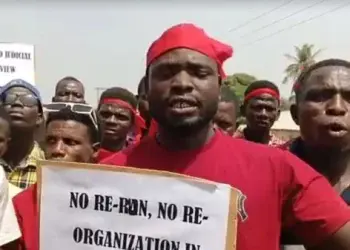The government has raised concerns that the intensifying missile attacks between Israel-Iran are driving up global crude oil prices, posing a serious risk to Ghana’s fuel expenses.
The Ghana Revenue Authority (GRA) has indefinitely suspended the controversial GH₵1 fuel or dumsor levy that was originally scheduled to take effect on Monday, June 16, 2025.
In a directive dated Friday, June 13, 2025, GRA Commissioner-General Anthony Kwasi Sarpong announced the postponement of the measure, which falls under the Energy Sector Levies (Amendment) Act, 2025 (Act 1141).
The suspension affects Tariff Interpretation Order (TIO) No. 2025/004, which would have added GH₵1 per litre to pump prices for petrol and diesel.
The GRA said the decision followed a directive from the Minister for Finance, issued after extensive consultations with key stakeholders across sectors.
Global oil volatility fuels caution
According to the GRA, the move was also influenced by recent surges in global oil prices due to heightened tensions in the Middle East.
Benchmark Brent crude spiked more than 10% following the escalation of hostilities between Israel and Iran, peaking at its highest level since January before retreating slightly.
Though prices eased somewhat, Brent crude still ended the trading day up 7%, at $74.23 a barrel.
Despite the jump, oil prices remain more than 10% below their levels a year ago and far from the highs of early 2022 when prices exceeded $100 a barrel in the wake of Russia’s invasion of Ukraine.
Price shock averted—for now
The suspended levy would have doubled the Energy Sector Shortfall and Debt Repayment Levy (ESSDRL), pushing petrol from GH₵0.95 to GH₵1.95 per litre and diesel from GH₵0.93 to GH₵1.93 per litre.
Marine gas oil and heavy fuel oil were also set to see sharp increases, though Liquefied Petroleum Gas (LPG) would have remained unchanged at GH₵0.73 per litre.
Had the levy taken effect, Ghanaian fuel consumers would have faced a cumulative GH₵3.35 per litre in fuel taxes and margins—up from GH₵2.35.
Currently, pump prices reflect at least ten separate levies, including the Energy Debt Recovery Levy (GH₵0.49), Road Fund Levy (GH₵0.48), Special Petroleum Tax (GH₵0.46), and others such as the Sanitation and Pollution Levy and BOST Margin.
Economic rationale vs. public pain
Government had projected that the new levy would raise an additional GH₵5.7 billion annually to help stabilise Ghana’s troubled energy sector.
But that rationale was soon drowned out by public criticism and mounting resistance from transport unions and civil society groups.
Transport operators threatened a nationwide strike, arguing that commercial drivers could not absorb yet another fuel hike.
“Our members are already reeling from high prices. Adding GH₵1 per litre is an act of provocation,” said one union leader.
Civil society organisations added their voices, warning that the levy could deepen the ongoing cost-of-living crisis, fuel inflation, and further weaken trust in government tax policy.
Power sector crisis looms
Defending the levy in Parliament earlier this month, Finance Minister Dr. Cassiel Ato Forson revealed that Ghana’s energy sector debt had ballooned to $3.1 billion by March 2025.
He warned that the country risks a systemic energy collapse unless swift fiscal interventions are made.
“Key power producers such as ENI and Karpowership have not been paid,” Dr. Forson said.
“This is now threatening the reliability of our electricity supply.”
The Minister also disclosed that Ghana had exhausted a $512 million World Bank International Development Association (IDA) guarantee and a $120 million Ghana National Petroleum Corporation (GNPC) facility—both of which were intended to secure solvency in the energy sector.
An additional $632 million is now required to restore those guarantees.
Mixed reactions from economists
Reactions from the economic community have been divided.
While some support a gradual broadening of the tax net to reduce the fiscal deficit, others have cautioned against hasty implementation of levies with direct inflationary effects.
Overtaxed and overburdened?
Public anger has also been fueled by the perception that fuel pricing in Ghana is already overburdened with taxes and levies.
According to the National Petroleum Authority (NPA), existing taxes account for over 20% of pump prices.
With the proposed GH₵1 increase, total levies would have soared to GH₵3.35 per litre, raising questions about affordability and equity in Ghana’s taxation structure.
Suspension, not cancellation
Despite the public relief, the fuel levy has not been scrapped.
Government sources say the suspension is a tactical move to allow for further engagement and avoid worsening current economic pressures.
“The tax is deferred, not abandoned,” one source close to the Ministry of Finance said.
“Revenue mobilisation for the energy sector remains urgent.”
Next steps: Consensus or conflict?
The GRA has not indicated when a new implementation date will be set.
Meanwhile, civil society groups are calling for a broad-based national dialogue on energy sector financing and fuel taxation.
Transport unions are also demanding a restructuring of existing fuel taxes to ease the burden on commercial drivers and consumers.
Whether government can balance its urgent revenue needs with the economic hardship faced by ordinary Ghanaians remains to be seen.












